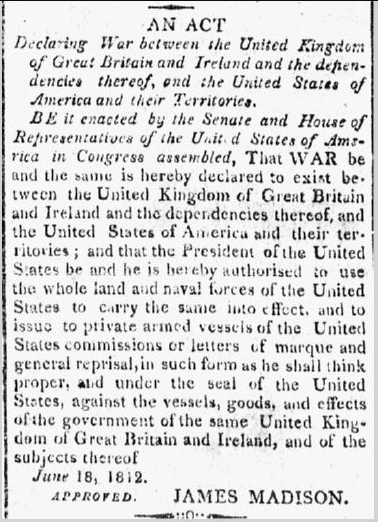In September 1783 the newly-formed United States of America and Great Britain signed the Treaty of Paris, formally ending the American Revolutionary War. Less than 29 years later, however, the two countries were fighting once again when the U.S. declared war on Great Britain on 18 June 1812, beginning the three-year conflict known as the War of 1812.
Despite a much-smaller regular army and navy, the U.S. once again defeated the world’s superpower—aided by the fact that Great Britain was busily fighting the French during the Napoleonic Wars at that time. Having twice asserted its independence, the United States in the decades following the War of 1812 built itself up into one of the richest and most powerful nations in the world.
On this day in history that marks the War of 1812 bicentennial, we remember the brave American soldiers that have served our country throughout its history, fighting to protect our liberty. Historical newspapers are a terrific resource for finding information on your military ancestors and other ancestors who lived in times of war. You can not only find specific details about their individual lives, you can also read about the times they lived in and what wars and other current events were affecting their thoughts and actions.
If your ancestors were living in America on 19 June 1812, then they may well have picked up their local newspaper and read the following article about the U.S. declaration of war against Great Britain—no doubt with keen interest, and perhaps a mixture of excitement and apprehension.

GenealogyBank’s online historical newspaper archives contain more than 6,100 newspapers from all 50 states, from 1690 to the present: over one billion articles to help with your family history research!
Search these historical newspaper archives and see what you can discover about your ancestors—and the times they lived in.
